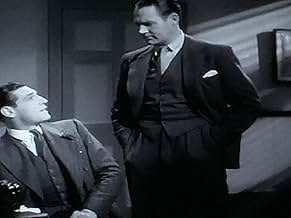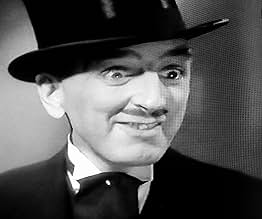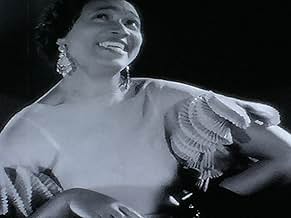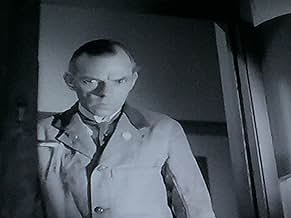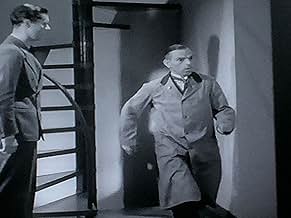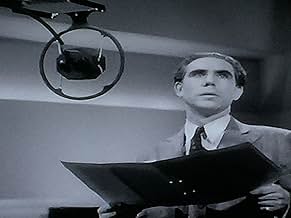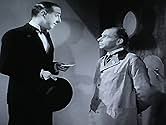When an actor is murdered at the BBC Inspector Gregory finds he has many suspects to choose from.When an actor is murdered at the BBC Inspector Gregory finds he has many suspects to choose from.When an actor is murdered at the BBC Inspector Gregory finds he has many suspects to choose from.
- Director
- Writers
- Stars
Lilian Oldland
- Joan Dryden
- (as Mary Newland)
Betty Ann Davies
- Poppy Levine
- (as Betty Davies)
Gershom Parkington
- Gershom Parkington - Musician
- (as Gershom Parkington Quintette)
- Director
- Writers
- All cast & crew
- Production, box office & more at IMDbPro
Featured reviews
The querulous, and frequently catty cast of a lurid radio play distressingly find them crime, as one of them is murdered by malevolent persons unknown! Sleekly suave Det. Inspector Gregory (Ian Hunter) is called upon to investigate the dastardly strangler in this splendidly entertaining 1930s whodunnit, greatly enlivened by a remarkably droll text, and many colourfully theatrical performances from an amusingly stiff upper-lipped cast of erudite British Thespians, including a very young Jack Hawkins. 'Death at Broadcasting House is ripping good yarn, energetically told by a fine ensemble cast of actors. 'Murder Immaculate indeed!' This consistently engaging thriller works splendidly as escapist entertainment, and is doubly fascinating as a delightfully vivid document of the frightfully middle-class milieu of Broadcasting House in the 1930s, it's truly wonderful that such beautifully made films are still available for future generations of film fans to enjoy.
Well, he did, and he was a writer and actor.
Val Gielgud appears in "Death at Broadcasting House" along with Ian Hunter, Austin Trevor, and Lilian Oldland.
When a radio actor is strangled on a live broadcast, a detective (Ian Hunter) comes to investigate. He finds adultery, previous history between some of the cast.
It's an interesting mystery, but it's not the star. The star is the wonderful art deco sets, and singing by both Elizabeth Welch and Eve Becke, and a dance number.
It's a short film, but enjoyable.
Val Gielgud appears in "Death at Broadcasting House" along with Ian Hunter, Austin Trevor, and Lilian Oldland.
When a radio actor is strangled on a live broadcast, a detective (Ian Hunter) comes to investigate. He finds adultery, previous history between some of the cast.
It's an interesting mystery, but it's not the star. The star is the wonderful art deco sets, and singing by both Elizabeth Welch and Eve Becke, and a dance number.
It's a short film, but enjoyable.
I always give early-1930s movies the benefit of the doubt, and I'm doing so here. An actor working alone in a radio studio room is murdered while reading his lines (in which his character is murdered). Someone in the studio building at the time killed him, but whom? There are only a few possible culprits, and most aren't very well defined characters. A few years later, this probably could have been a very good movie, but it's barely passable here. I suspect much of the appeal of this film when it was released came from the behind-the-scenes look at a working radio studio, with actors in multiple rooms, and orchestra in another, and crew in still others. You even get a song and a dance number, although the appeal of a dance number on radio, including dancers in full costume, escapes me.
If you enjoy 1930s crime/mysteries, then this is worth a watch. The detective doesn't define himself particularly well, but the genre plays out reasonably true to form. I gave it a 6 for slightly better than average.
If you enjoy 1930s crime/mysteries, then this is worth a watch. The detective doesn't define himself particularly well, but the genre plays out reasonably true to form. I gave it a 6 for slightly better than average.
Although terribly dated and about a form of media that is passe in modern times, Death of a Broadcast is still an entertaining whodunnit. The death of one of the radio actors during a live broadcast is the basis for the film.
The actor is strangled during a scene in which he is supposed to be strangled in the play. The coincidence of events is very convenient for the killer. A rather novel murder mystery then unfolds. Worth viewing despite the dated content.
The actor is strangled during a scene in which he is supposed to be strangled in the play. The coincidence of events is very convenient for the killer. A rather novel murder mystery then unfolds. Worth viewing despite the dated content.
"Please!!....can't you put more feeling into your death scene"!! - and
unfortunately for Parsons, he puts too much feeling into it, he is
murdered!!
A pristine print makes this an enjoyable view - not only is there a murder but it must have been an interesting peek for audiences at the workings etc of the BBC - there's even a variety show with a bevy of beautiful, talented chorus girls (going through their routine in a professional way). The lovely Eve Becke shows she had a way with a song but the highlight for me is the beautiful Elisabeth Welch singing the sultry "Lazy Lady" with all the muscians thoroughly enjoying the performance.
The murder investigation plays out among the beautiful Art Deco settings of Broadcasting House, led by a very believable performance from Ian Hunter as Det. Insp. Gregory (Hunter was so good in British movies, it's only when he went to Hollywood, he turned stodgy and boring). The rest of the cast lived up to the way audiences of the time probably felt they spoke and behaved - very toffy, elocution lesson stuff. Val Gielgud, writer of the original book and screen play, gave himself a plum role as Julian Caird, the play's ("Murder Immaculate") producer and his performance shows why he spent many years as BBC's Head of Sound and Drama but didn't venture in front of the camera too often.
The victim, Parsons, was a professional blackmailer and an interesting plot twist was having the leading man, Leopold Dryden as being very unlikable and slipping out of the recording studio at around the time of the murder. Played fittingly by Austin Trevor who was the first actor to portray Hercule Poirot on film. Rounding out the cast was Peter Haddon who excelled in "silly ass" types and provided the movie with it's supposed humour as a top hatted gent looking for an alibi!! Jack Hawkins at the beginning of his career, he's Bert Evans, in a sizable part one of the actors and someone who has a crush on the leading lady and Henry Kendall as the playwright, with wit as dry as crisp toast and also with a very healthy yen for Mrs. Dryden (a pretty and dewy eyed Mary Newland). And then there's Mrs. Dryden - has she anything to hide in her past? Just why is she so upset when Gregory finds an old playbill!!
A pristine print makes this an enjoyable view - not only is there a murder but it must have been an interesting peek for audiences at the workings etc of the BBC - there's even a variety show with a bevy of beautiful, talented chorus girls (going through their routine in a professional way). The lovely Eve Becke shows she had a way with a song but the highlight for me is the beautiful Elisabeth Welch singing the sultry "Lazy Lady" with all the muscians thoroughly enjoying the performance.
The murder investigation plays out among the beautiful Art Deco settings of Broadcasting House, led by a very believable performance from Ian Hunter as Det. Insp. Gregory (Hunter was so good in British movies, it's only when he went to Hollywood, he turned stodgy and boring). The rest of the cast lived up to the way audiences of the time probably felt they spoke and behaved - very toffy, elocution lesson stuff. Val Gielgud, writer of the original book and screen play, gave himself a plum role as Julian Caird, the play's ("Murder Immaculate") producer and his performance shows why he spent many years as BBC's Head of Sound and Drama but didn't venture in front of the camera too often.
The victim, Parsons, was a professional blackmailer and an interesting plot twist was having the leading man, Leopold Dryden as being very unlikable and slipping out of the recording studio at around the time of the murder. Played fittingly by Austin Trevor who was the first actor to portray Hercule Poirot on film. Rounding out the cast was Peter Haddon who excelled in "silly ass" types and provided the movie with it's supposed humour as a top hatted gent looking for an alibi!! Jack Hawkins at the beginning of his career, he's Bert Evans, in a sizable part one of the actors and someone who has a crush on the leading lady and Henry Kendall as the playwright, with wit as dry as crisp toast and also with a very healthy yen for Mrs. Dryden (a pretty and dewy eyed Mary Newland). And then there's Mrs. Dryden - has she anything to hide in her past? Just why is she so upset when Gregory finds an old playbill!!
Did you know
- TriviaThis film received its earliest documented USA telecasts in Los Angeles Sunday 16 October 1949 on KFI (Channel 9) and in New York City Saturday 11 February 1950 on WPIX (Channel 11).
- Quotes
Rodney Fleming: [to the lift-man] I'm looking for Variety.
lift-man: That's eight floors down.
Rodney Fleming: But I've just come eight floors up!
lift-man: Then it'll be sixteen floors down.
- ConnectionsReferenced in Those British Faces: A Tribute to Jack Hawkins 1910-1973 (1993)
Details
- Release date
- Country of origin
- Language
- Also known as
- Death at a Broadcast
- Filming locations
- A.S.P.I. Studios, Wembley Park, Middlesex, England, UK(studio: produced at A · S · P · I Studios Wembley Park)
- Production company
- See more company credits at IMDbPro
- Runtime1 hour 15 minutes
- Color
- Aspect ratio
- 1.37 : 1
Contribute to this page
Suggest an edit or add missing content

Top Gap
By what name was Death at Broadcasting House (1934) officially released in Canada in English?
Answer
